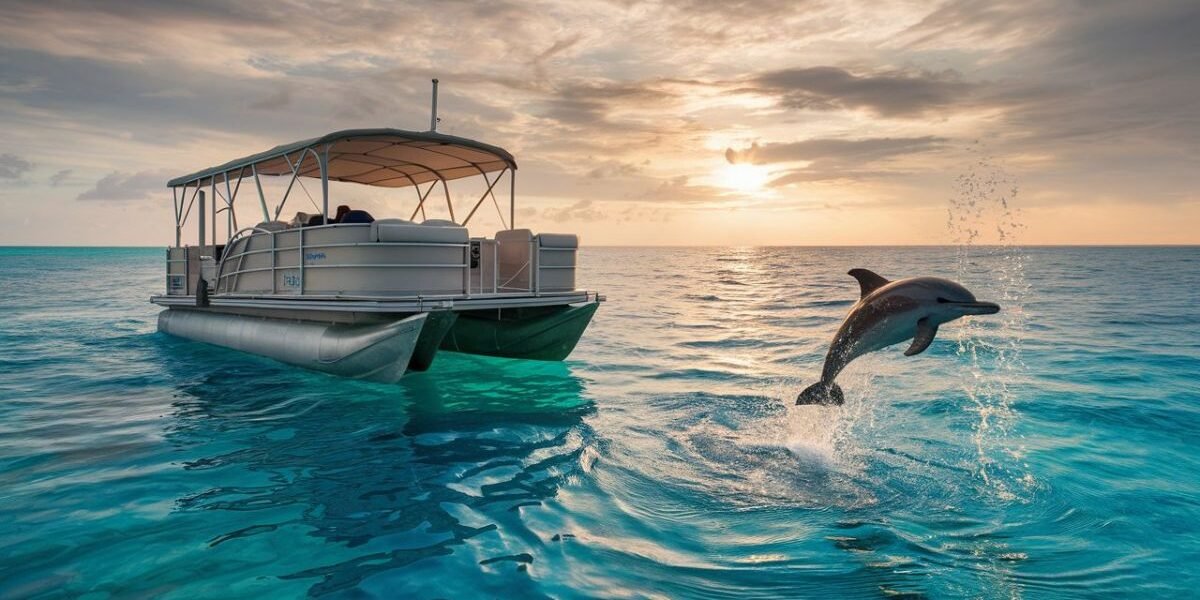Can You Take a Pontoon Boat in the Ocean
So, you’re wondering if you can take a pontoon boat in the ocean.
It is subject to the size of water vessel that you have and its type.
However, for open sea, traditional pontoons may not be the most ideal selection but instead tritoons are designed to handle rough waters.
If you plan on cruising in a still bay or inlet then yes, you can use a pontoon boat.
But it’s advisable not to take pontoon boats into ocean water.
All pontoon boats are not created equal when it comes to withstanding unpredictable conditions of oceans.
Ensure the boat has necessary safety equipment such as life jackets and buoyancy aids if you are taking your pontoon offshore.
Ocean specific pontoon boats may be a good choice for boaters who love saltwater boating activities such as fishing or snorkeling in deep sea areas.
These vessels are made stronger, zinc anodes for salt water use and generally better seaworthy than any other type of pontoon boat.
Also remember that how well the boat handles the ocean is determined by its design which includes among others width,length,height above waterline etc…
Evaluate first whether this kind of vessel will be able to navigate through rough seas before using one in the ocean.
Is it Safe to Take a Pontoon Boat in the Ocean?
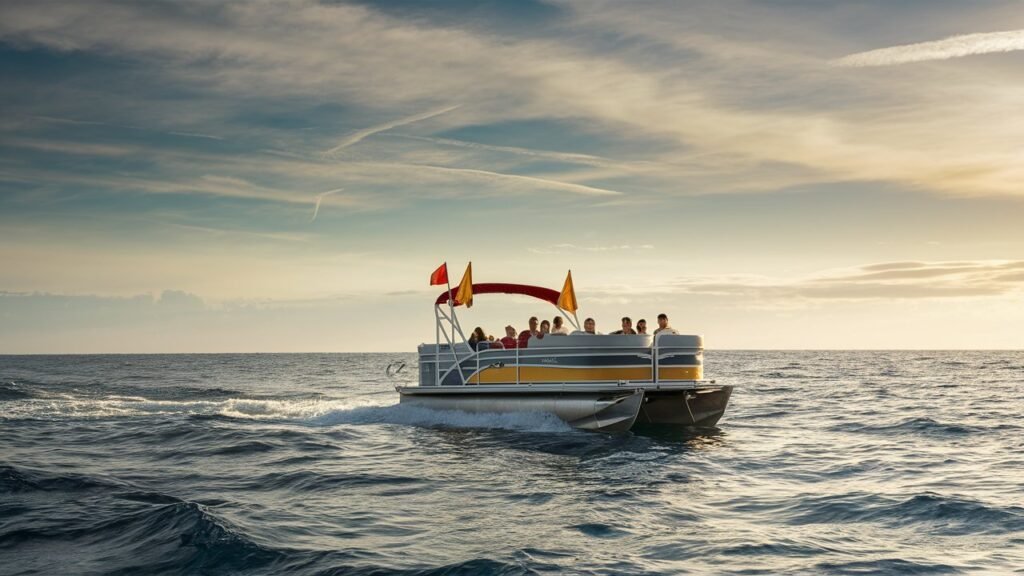
So, you may be wondering whether it is safe to take a pontoon boat in the ocean.
Well, actually the answer depends on various things.
If one is careful enough then pontoon boats can certainly be used in the ocean, although not all boats go into the ocean anyway.
You need to assess its seaworthiness and be ready before taking your ship out into that wide blue yonder.
It is important for any person who owns a boat to always check weather conditions and ensure that their pontoon boats are suitable for offshore cruising.
If rough conditions make it unsafe for any other vessel types in the ocean then it won’t be ideal taking these kinds of boats there either.
These recreational crafts are made with calm shallow waters in mind but not deep sea areas.
Sure, some pontoon boat models have double-decker features and lifting strakes, but that doesn’t mean the boat can go anywhere.
Always think about the instability that can come with taking a pontoon out in the open water.
Recommended Safety Precautions for Using a Pontoon in Saltwater
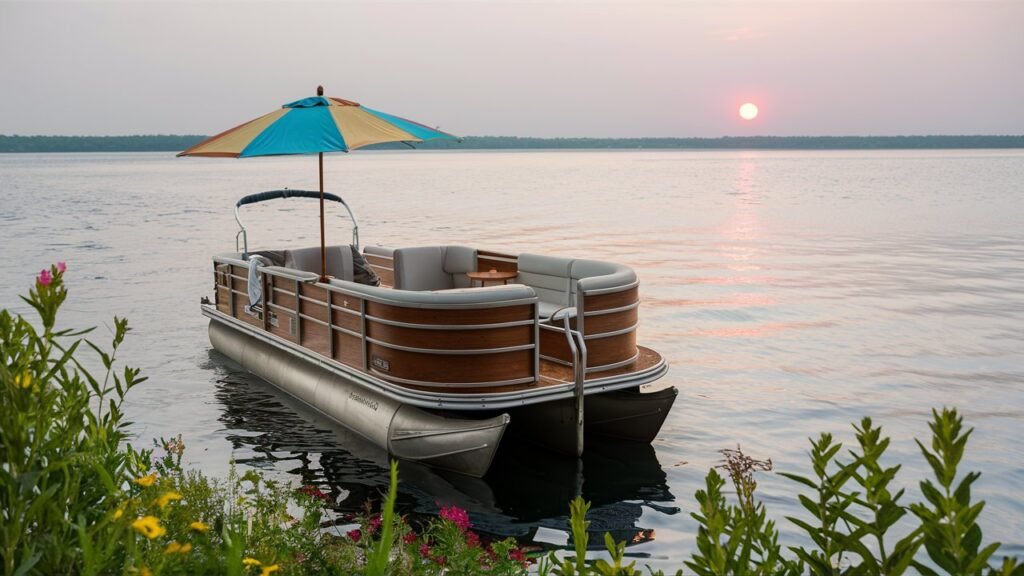
Tubing in saltwater is a lot of fun but safety must come first.
Driving your pontoon boat in the open sea entails considering numerous things.
The ocean differs from calm lakes and rivers so you need to ensure that your pontoon can handle rough water conditions.
Some of the most excellent pontoon boats are built for saltwater packages with metal tubes and a large deck that provides more stability.
When the waves get choppy, having a double-decker pontoon might make all difference.
Before taking your pontoon boat into saltwater it is critical to observe all safety measures.
Always read manufacturer instructions and guidelines because many factors determine how safe your toon will be kept while at it.
The kind of water one is navigating through, passengers’ number on board as well as equipped saltwater packages should be considered for safe rides with your Toon.
But even when the weather is good, unexpected waves can still pose danger therefore one should always be ready for anything.
What to Consider Before Taking Your Pontoon Boat in the Ocean
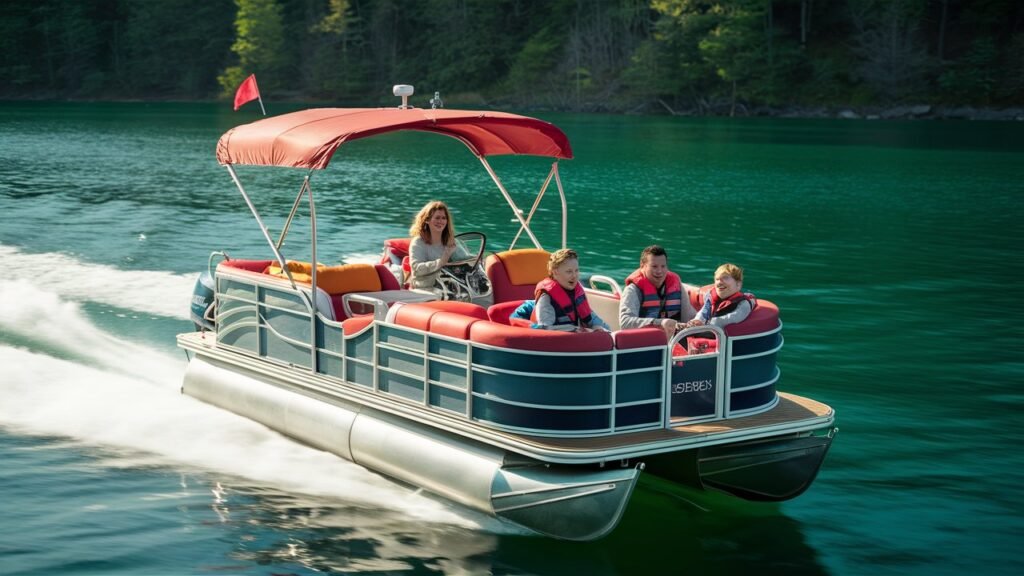
When planning to sail the ocean with your pontoon boat, there are some factors which you should bear in mind.
Before anything else is said about it, pontoon boats are made for serene waters such as lakes and rivers but not the open sea.
The ocean has a completely different environment from the surface of water where your pontoon usually floats.
One important factor to think about is the risk of galvanic corrosion when exposing your pontoon boat to saltwater.
One must rinse out the engine with clean water after each use in saltwater or else it will get ruined.
Another thing that could happen is if there are big waves and strong currents it might make the boat heavier which increases risk for capsizing.
Pontoon boats aren’t built for open ocean travel, so they are a bad idea in rough seas for two reasons: firstly their design does not take into account such extreme conditions; secondly, being made of aluminum they cannot withstand prolonged exposure to saltwater spray without corroding rapidly.
Never be fooled by calmness at sea – even on sunny days when everything seems fine, within hours or even minutes everything may change dramatically and one should always be prepared accordingly
To sum up my thoughts about this topic I want to say that people need to think twice before taking their pontoon boats out into the vastness of the ocean because there are many dangers waiting for them.
Importance of Maintenance for Saltwater Pontoon Boats
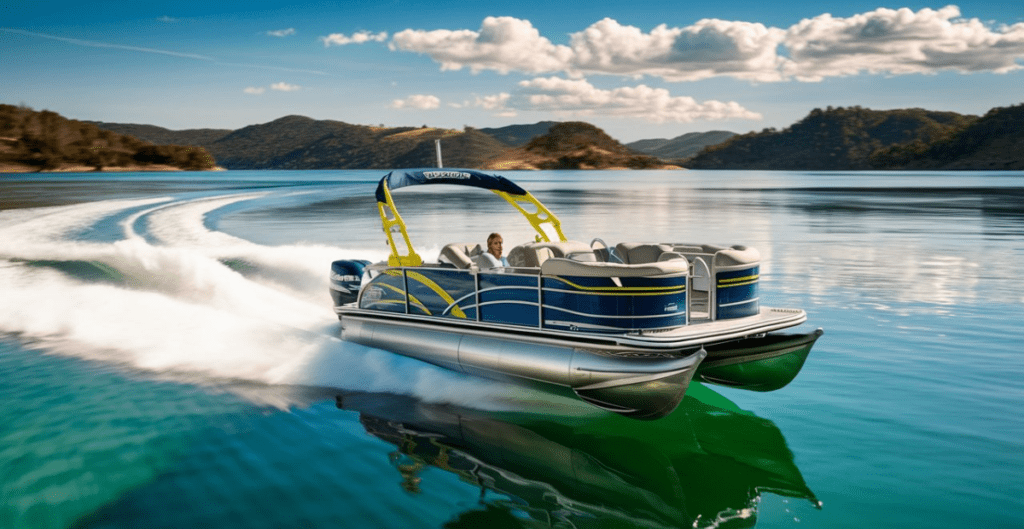
Ahoy there, lovers of pontoon boats! Allow me to expound upon the vitality of maintaining your saltwater pontoon boats.
To start things off, these bad boys can handle some serious rough seas but they do require a little bit of care in order for everything to run as smooth as silk.
If you want your pontoon boat to be used for years to come, it’s crucial to keep up with regular maintenance.
That said, and also during your time sailing the sea.
Before you even begin to take your pontoon out for a drive there are some things you should think about.
Do you have all of the necessary maintenance equipment?
Have you looked over the engine, hull, and electrical system for any signs of damage or deterioration?
Just taking a second to answer these questions can really save you later on.
It’s also recommended for pontoons to have a regular cleaning schedule to prevent corrosion from the saltwater.
This implies rinsing the vessel after every use and giving it a good wash sometimes.
By doing these care practices, you will be able to maintain the best condition of your pontoon so that it can be used for all your salty escapades.
Recognizing the Risks of Capsize in Rough Water
To avoid sinking your pontoon in turbulent waters, here are some things you need to know.
Like those waves can get huge, yeah? And the last thing you want is for your boat to capsize, right?
I’m telling you man, it’s a living hell. So just be sure that you do.
Also, perhaps check out the weather forecast and see what’s happening outside. It could be a little choppy.
And don’t forget about balancing the weight on your pontoon too. You wouldn’t want everyone standing on one side, causing everything to tip over!
How to Ensure Your Pontoon Boat is Ocean-Ready
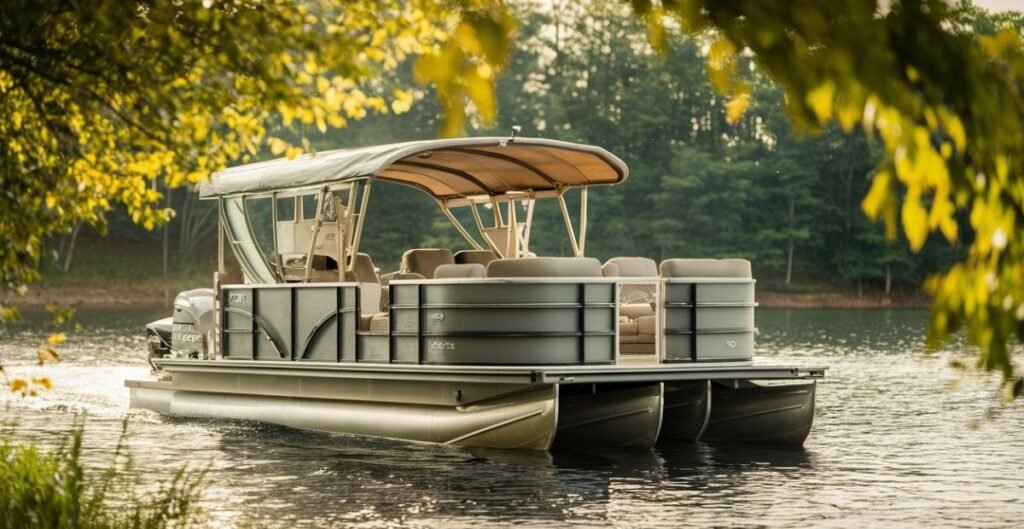
So you’re considering a journey on the seas with your pontoon boat?
There are some things to think about before taking a pontoon too far from land.
To begin with, perform any required maintenance checks on your vessel so that it is fit for the ocean.
You don’t want to end up stuck out there without a working motor!
Additionally,
ensure you have all necessary safety gear aboard.
The sea can be very fickle and it’s best to be ready for anything.
Lastly,
always check the weather forecast before leaving. You wouldn’t want to get caught in a storm with your boat high and dry!
Benefits of Tritoon Design for Ocean Waters
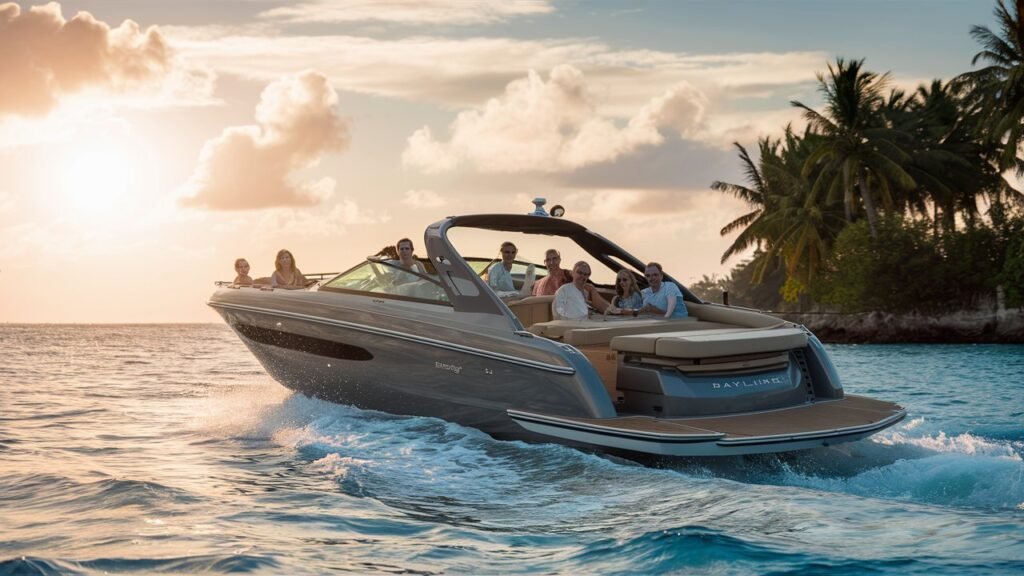
What I’m saying is, have you ever seen those really nice tritoon boats?
I mean, they’re perfect for cruising the ocean.
Since they’ve got three tubes instead of two like a normal pontoon boat and all, tritoon boats can handle choppy waves like nobody’s business.
Not only that but they also have way better stability and performance so it feels like you’re flying just above the water.
Oh yeah — most tritoon designs come with sacrificial anodes to protect against corrosion too.
That means less time spent on maintenance and more time having fun out on the water!
Best Practices for Taking a Pontoon Boat in Open Water
Pontoon boats are extremely entertaining for going around the lake, but if you wish to bring one into open water, there’s a few things that should be taken into account.
In the first place, put on everything safety — life jackets, first aid kit and so on.
Secondly, always check the weather before you go out. Those waves can be really wild!
And most importantly – know yourself; If it gets choppy don’t be afraid to turn around and head back towards calm water.
Some of them can take quite a beating but it is never wrong with playing safe.
So grab your buddies, crack open a cold one and have fun!
Adhering to Manufacturer’s Instructions for Ocean Usage
Therefore, you must always stick to the Manufacturer’s Instructions when taking your pontoon boat out on the ocean.
Because they know what they’re talking about, right?
For safety reasons and everything, you want to use the boat in the way it was designed to be used.
conclusion
In short, pontoon boats are a great choice for smooth sailing in bays and lakes. But they cannot be used in the ocean without thinking about it.
Common pontoons may not handle with the ocean’s unpredictable conditions well; however, tritoons are more stable and perform better thus can navigate rough waters.
Safety must always come first when taking any boat to sea even if it is a pontoon boat.
Before you go cruising on the ocean with your pontoon boat, make sure that you have all necessary safety equipment fitted and also assess its seaworthiness based on what it might encounter there.
Maintenance should be done regularly as per manufacturer’s instructions while getting ready for sudden changes in weather and water conditions is a must-do thing.
Ultimately, having knowledge about what your pontoon boat can do and cannot do will enable you to stay safe while making decisions that are well informed during such times when one goes out into the waters.
